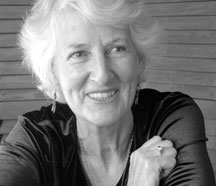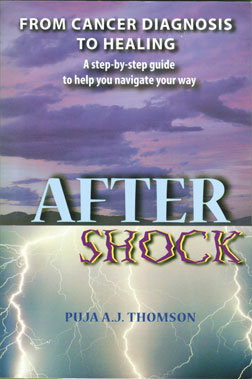|
|
|
So You’ve Just Been Diagnosed—What Now?
by Puja A. J. Thomson • New Paltz, NY
From the first moment of shock upon hearing your diagnosis, the earth may seem to give way under your feet and a whole range of unexpected feelings may flood through you.
It is natural to fear the consequences. You may want to deny this is happening to you. You may feel paralyzed when it comes to making decisions. It is not uncommon to feel as if you are at the mercy of outside forces, or pressured by the seeming certainty of professional opinions. I certainly did. Please don’t judge yourself or be ashamed of having cancer. There’s no accounting for the fact that some people who do all the “right” things get cancer, while others who are not at all health conscious get off scot-free.
Whether your diagnosis is conveyed to you abruptly or as kindly as possible, the impact of cancer can still, without a doubt, be like a blow to the solar plexus. I thought I was home free—with a cancer-free or pre-cancerous condition at most when I heard my diagnosis—ductal carcinoma in situ, stage 0. My mind had quickly latched on to the last phrase of my doctor’s words, “stage zero,” skipping over the other medical words I didn’t recognize. All my life I have understood “zero” to mean “0” or “nothing.” So I relaxed and settled down with a smile on my face, expecting to hear good news about my recent biopsy. Instead, my diagnosis, DCIS for short, indicated the presence of cancerous calcifications contained within the ducts of my left breast. I was told I was “one of the lucky ones,” but stage 0, I discovered, was not a cause for celebration with a “Thank God, there’s no cancer.” Rather, the news was conveyed with the foreboding tone of an uncertain future, implying “there appears to be no lymph involvement… yet.” I became confused and wary. Apparently in medicine, “0” means something, not nothing. I was beginning to learn the language of cancer. And a wave of anger surfaced.
Some of you may be thinking, “Well, that’s no big deal.” But that was when my inner turmoil and deeper journey began. Cancer is cancer, no matter what stage it is. Subterranean fears, I discovered, lurk all around. Anyone diagnosed with cancer is embarking on a life-altering, bewildering, and sometimes overwhelming journey. Your health is now your top priority. It is important that you muster energy to become involved in your healing process, for ultimately the decisions about treatment are yours alone to make. Before you lies the challenge of understanding medical and technical language and making decisions for your future health. Therein lies much growth and empowerment. Decide that you are in charge of your life, because you will undoubtedly find others—a doctor, a spouse, a friend—wanting to make decisions on your behalf, “all for the best” of course as they see it.
In the early days following your diagnosis: 
• Welcome the hugs of family and friends. Let yourself be loved!
• There is no right way to handle the news. It is not inappropriate to watch TV, burst into tears, scream in your car or want to go for a long walk.
• It is a blessing to have someone close to you, a specially trusted family member, friend or counselor who is willing to listen to you, perhaps hold your hand and be comfortable with your tears, your confusion, fear or anger, if you experience such feelings.
• Trust yourself. Avoid spending time with those who try to make you talk if you don’t want to, or try to get you to stop talking if you need to.
• Once you have dealt with your initial reactions, take your time to gather information and think about your choices but also don’t procrastinate making a decision. Set a “decide-by” date to aim for. Waiting too long may not be in your best interests.
• Ask yourself “What can I do to help myself become well?” instead of worrying about questions such as “Why me?”
• Read the inspiring stories of those who have survived your type and stage of cancer. Take hope that so many, in spite of a bleak prognosis from their doctor, have courageously generated their own hope and worked towards healing.
• Write your thoughts and feelings down in a private journal as your journey unfolds.
• You may never be quite the same again. This is a life-challenging journey. Through it you may discover unexpected strengths within you. Be gentle and kind to yourself.
Excerpted from Puja A. J. Thomson’s new book AFTER SHOCK: From Cancer Diagnosis to Healing. $19:95; ISBN 1-928663-05-2; 6 x 9 Paperback, 234 pages; includes index, bibliography and directory of Resources; Distributed by New Leaf, Ingram, Baker & Taylor, Amazon, Barnes & Noble.
Puja Thomson has drawn from her personal experience of breast cancer as well as her training and skills as a health care professional, director of educational programs, transformational therapist, minister, and workshop leader. Thomson is the founding director of ROOTS & WINGS and has created Roots & Wings—Guided Imagery and Meditations to Transform Your Life, an audio with music by Richard Shulman (1996) and a companion workbook (1999).
|

